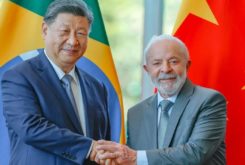The Brazilian government wants a review of the beef exports health protocol with China that determines the automatic suspension of shipments when a case of mad cow disease is detected, even before its nature is defined.
Brazilian authorities presented to the Chinese counterparts on March 07, by videoconference, the result of the investigation by the World Organization for Animal Health to a mad cow disease case in Pará state, which determined that it was an atypical case, when the animal develops the disease due to old age and not the transmissible version, without risk to the herd or humans.
“They (the Chinese) may have some questions, but the expectation is that they will give the answer (about the end of the embargo) tomorrow or later,” said the special advisor to the Ministry of Agriculture, Carlos Ernesto Augustin (pictured above).
At the request of Brazilian producers, the Brazilian government will ask for a renegotiation of the protocol signed in 2015 for a more restricted version, which does not prevent the export of meat from all over the country when there is a record of bovine spongiform encephalopathy (BSE), known as mad cow disease.
“We will talk later and try to change the protocol. It doesn’t have to be that extensive”, Augustin said, quoted by the Brazilian press.
An alternative would be, for example, to place an embargo on the export of meat from the state or region where the case of the disease was registered, explained the advisor.
Brazil beef exports to China halted after case of mad cow disease
An atypical case of mad cow registered in Mato Grosso, in 2012, had led to the suspension of imports of Brazilian meat by several countries.
However, as in 2012, all records of the disease made in Brazil – there were others in 2019 and 2021 – were called atypical. The country has never recorded classic cases of mad cow, which can proliferate and cause damage to the herd.
According to World Organization for Animal Health standards, Brazil is still considered a country of insignificant risk for the disease, which would justify a less rigid protocol.




